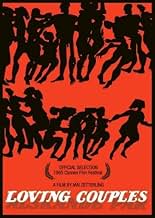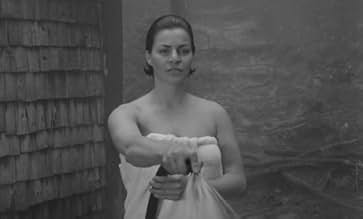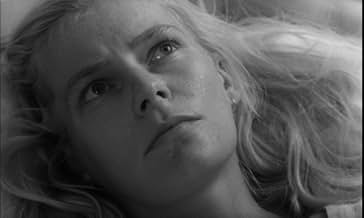1914, Stockholm. Trois femmes sur le point d'accoucher se rendent à l'hôpital. De conditions sociales diverses, Agda, Adele et Angela se remémorent leur enfance, leurs amours déçus et leurs ... Tout lire1914, Stockholm. Trois femmes sur le point d'accoucher se rendent à l'hôpital. De conditions sociales diverses, Agda, Adele et Angela se remémorent leur enfance, leurs amours déçus et leurs illusions perdues..1914, Stockholm. Trois femmes sur le point d'accoucher se rendent à l'hôpital. De conditions sociales diverses, Agda, Adele et Angela se remémorent leur enfance, leurs amours déçus et leurs illusions perdues..
- Réalisation
- Scénario
- Casting principal
- Récompenses
- 1 nomination au total
Jan-Erik Lindqvist
- Peter von Pahlen
- (as Jan-Eric Lindquist)
Avis à la une
A cynical view of marriage and love relationships in Sweden in 1914. In a totally patriarchal society women are left to use sex and motherhood as a form of power, which effectively gives them a substantial slice of influence but does not bring them any happiness.
If women's destiny is to seek love, as one of the characters says, we don't see it at all in this film. It is forbidden to them by the established social model.
Due to Nykvist's beautiful cinematography and a lot of excellent actors that we are used to see in Bergman's movies, this would even seem, at first glance, to be a film by this director. But, unlike Bergman, who always imprints a strong ethical sense on his stories, here we are at the opposite end of the spectrum, a complete cynicism when it comes to human and social values. This is a real world, a dog world and not a principled world.
A pleasant surprise.
If women's destiny is to seek love, as one of the characters says, we don't see it at all in this film. It is forbidden to them by the established social model.
Due to Nykvist's beautiful cinematography and a lot of excellent actors that we are used to see in Bergman's movies, this would even seem, at first glance, to be a film by this director. But, unlike Bergman, who always imprints a strong ethical sense on his stories, here we are at the opposite end of the spectrum, a complete cynicism when it comes to human and social values. This is a real world, a dog world and not a principled world.
A pleasant surprise.
It's a wonderful film although certainly a rather cynical view of marriage and love, evidently in Sweden in 1914, or maybe somewhere else and a later time. The ladies, Alda, Adela and Angela played by Harriet Anderson, Gunnel Lindalom and Gio Petre absolutely splendidly. At the beginning there are the three in the stark hospital and all each expecting a child. There are three rather different stories and we have flashbacks of them so the slow and rather sad beginning really gets going with a lot of fun and sex and surprises all the time. There is nudity and passionate scenes that it is rather surprising for the early 60s and caused a problem in many countries. The cinematography is fantastic by Sven Nykvist like the shots in the woods and with the frolicking and much drinking during the midsummer celebration and also in the fantastic pretend marriage with two gays and the sublime Anderson.
There is no doubt that the Swedish actress Mai Zetterling, in her feature-length directing debut, had Ingmar Bergman in her mind: the cast is full of Bergman veterans, the cinematography is by the emblematic Bergman collaborator Sven Nykvist, and the whole style of the movie is modelled on her famous compatriot. Technically, the imitation is accurate: the film is well-made, the acting is fine, and I liked how Zetterling contrasted three different types of women - one happy all the time, one never happy, one somewhere in between. But the stories are too long and meandering, and for a movie so heavily dependent on flashbacks (about 80% of the running time), the flashbacks themselves are not especially revealing. **1/2 out of 4.
Technically speaking, this is a good film--with decent cinematography and production values. But, while it is a competent film, I also found myself wanting to turn off the DVD repeatedly because I just didn't find myself at all interested. There are a variety of reasons, though the biggest of which is because it seemed as if I'd seen all this before in various Ingmar Bergman movies--in particular, THE BRINK OF LIFE ("Nära livet"--1958). Also , the angst and sense of isolation and fruitlessness of life was pervasive and just made me feel depressed. After watching this film, I could easily say that the overall message of the film is "life stinks and love is a sham,...then you die".
Now this does NOT mean that I think all movies must be upbeat or positive in tone--far from it. But even a grim movie can be great and compelling when you feel SOME connection to the characters. For example, I just recently saw De Sica's THE CHILDREN ARE WATCHING. It is a major tear-jerker and is the extremely sad story about the break up of a marriage and its impact on a child. BUT, I really cared about De Sica's characters and cared absolutely nothing for Zetterling's. Of the three women featured in the film, one was a lady of privilege with little depth or personality, one a bubble-headed servant and the other a bitter and nasty soul. I just wanted them all to go away and leave me alone!
Now as for this being a controversial film--which it definitely was when it debuted in the 1960s. The nudity but especially the themes of homosexuality and lesbianism were pretty controversial for its day, though by today's standards it's all pretty tame. I still wouldn't let my kids watch the film, but not just because of the nudity and themes but because I love my kids too much to make them watch such an unappealing film.
Now this does NOT mean that I think all movies must be upbeat or positive in tone--far from it. But even a grim movie can be great and compelling when you feel SOME connection to the characters. For example, I just recently saw De Sica's THE CHILDREN ARE WATCHING. It is a major tear-jerker and is the extremely sad story about the break up of a marriage and its impact on a child. BUT, I really cared about De Sica's characters and cared absolutely nothing for Zetterling's. Of the three women featured in the film, one was a lady of privilege with little depth or personality, one a bubble-headed servant and the other a bitter and nasty soul. I just wanted them all to go away and leave me alone!
Now as for this being a controversial film--which it definitely was when it debuted in the 1960s. The nudity but especially the themes of homosexuality and lesbianism were pretty controversial for its day, though by today's standards it's all pretty tame. I still wouldn't let my kids watch the film, but not just because of the nudity and themes but because I love my kids too much to make them watch such an unappealing film.
Three women at a lying-in hospital reflect on how they got there in Mai Zetterling's first feature as a director.
I was surprised at how Bergmanesque this movie was, although not as overtly cerebral. Of course a good deal of that can be attributed to the presence of Harriet Anderson, one of Bergman's frequent leading ladies, and Sven Nyquist being the cinematographer; but while it looks like a duck and walks like a duck, it doesn't quack like a duck. Instead of Bergman's meditation on keeping society going in a G*dless universe, it considers woman's place in a society run for the benefit and pleasure of its men; and the continuation of society depends more on popping out babies, a process which the women don't have on their minds when they get pregnant. Bergman may mourn the absence of G*d, but to Zetterling, He's irrelevant.
I was surprised at how Bergmanesque this movie was, although not as overtly cerebral. Of course a good deal of that can be attributed to the presence of Harriet Anderson, one of Bergman's frequent leading ladies, and Sven Nyquist being the cinematographer; but while it looks like a duck and walks like a duck, it doesn't quack like a duck. Instead of Bergman's meditation on keeping society going in a G*dless universe, it considers woman's place in a society run for the benefit and pleasure of its men; and the continuation of society depends more on popping out babies, a process which the women don't have on their minds when they get pregnant. Bergman may mourn the absence of G*d, but to Zetterling, He's irrelevant.
Le saviez-vous
- AnecdotesMai Zetterling's directorial debut.
- Citations
Dr. Jacob Lewin: I can't do much unless you take your pants off and lie down.
- ConnexionsFeatured in Vielleicht bin ich wirklich eine Zauberin (1989)
- Bandes originalesBagni di Lucca
Composed by Giuseppe Manente (1903)
Meilleurs choix
Connectez-vous pour évaluer et suivre la liste de favoris afin de recevoir des recommandations personnalisées
- How long is Loving Couples?Alimenté par Alexa
Détails
- Durée1 heure 58 minutes
- Couleur
- Mixage
- Rapport de forme
- 1.66 : 1
Contribuer à cette page
Suggérer une modification ou ajouter du contenu manquant

Lacune principale
By what name was Les amoureux (1964) officially released in India in English?
Répondre




































